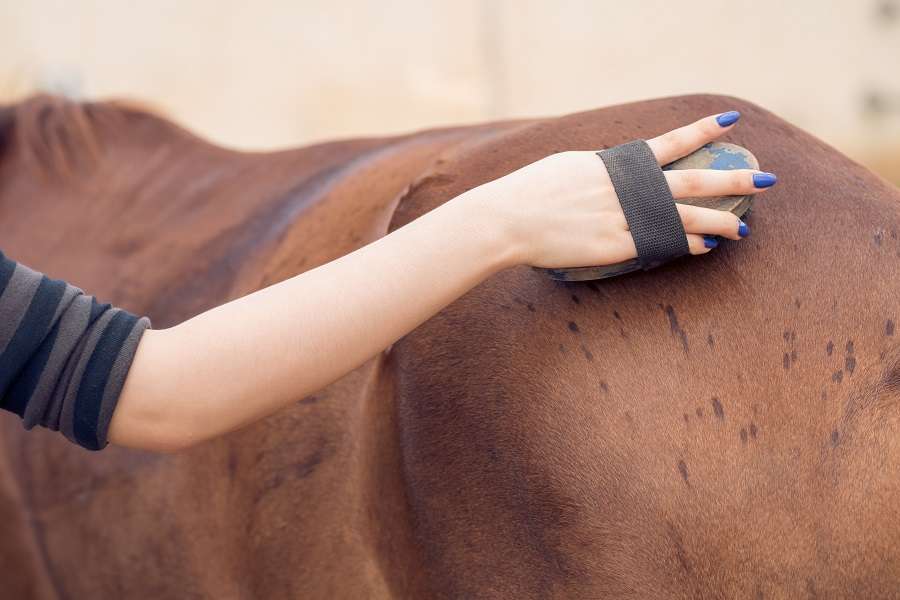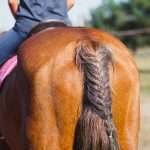
One of the best indicators of good horse health is the skin and coat. A shiny coat isn’t just attractive, it also shows that a horse is in top shape. Proper equine skin care is paramount.
When your horse has rashes, swelling, bumps and even irritation, these are clear signs that there is a problem. It is good to note that these signs may not just indicate poor skin health, they may suggest an underlying health condition. The following information gives you top tips on things you should know about horse skin care.
It starts with a proper diet
A shiny glowing coat comes when your horse is eating right. This means that the diet must be balanced with all the vital and essential nutrients. The quality of the food must also be high. Omega 3 fatty acids are particularly beneficial to equine skin. Therefore, supplementing this nutrient is key to enjoying even better horse skin health. When your horse is well fed and properly hydrated with clean water every single day, the internal functions will promote healthy skin and coat. In addition to water, your horse will need high quality protein.
Protein helps build body cells while promoting healthy skin. It also builds the right hormones, and promotes the development of muscles and enzymes. For energy, your horse will need fat and carbohydrates. As high energy creatures, horses need the fuel to build their strength. Other nutrients are minerals and vitamins. Exposure to sunlight boosts the production of vitamin D and this is great. Without a proper diet, equine skin health will be compromised greatly.
Be careful about exposure to sunlight
As alluded to above, sunlight helps in vitamin D synthesis which is good for your horse. However, too much exposure to the sun is detrimental in horses just like in humans. In fact, there is a list of skin issues that arise from UV light exposure. First, horses can get sunburns which can be very painful. Pink areas of the skin will suffer the most. Sunlight can also trigger photosensitivity. Some plants and even medications make horses photosensitive and when exposed to sunlight, painful blisters form. Another problem is the formation of skin tumors due to prolonged sunlight. As you can see, the sun can prove more harmful to your horse.
You can remedy these problems by preventing excess exposure to the sun. Provide a shade for your horse so that they can be shielded accordingly. You can also consider sun shielding sheets which come with UV blocking abilities. These are used like garments for your horse. Consider a sunscreen for your horse and a good example is zinc oxide. Use in the most sensitive areas. Also, avod photodynamic plants like St. John’s wort. If your horse is showing signs of skin issues caused by the sun, expert help is needed.
Bug bites are detrimental
In summer months or hot weather, a host of insects will thrive. Your horse can become the victim of uncomfortable bites. It is not just temporary discomfort you have to worry about for such bugs: there are serious skin issues that can develop; like a condition called ‘sweet itch‘. This is an allergic reaction that causes hypersensitivity in horses. This condition can last very long and some horses are more predisposed to it.
The bugs that cause this problem include stable flies, horn flies, black flies; among others. The best way to remedy this problem is to use insect repellents together with insecticides. Spraying will help reduce the problem. For horses that have already been afflicted by sweet itch, seeking the right treatment from your vet is the best way to go. Prevent exposure to bugs as much as possible to avoid escalation of the problem.
Keep horse skin and coat dry
It is hard to prevent exposure to moisture in horses. However, continual wetness and dampness will soften the skin. This will in turn give way to fungal and bacterial infection. As a result, your horse will always be scratching. This can lead to dryness and cracking. In some cases, scabs and crusts are formed from oozing skin. You therefore want to keep your horse as dry as possible. Horse bedding and stall must be dry at all times. Draining water that forms in puddles is also important to keeping your stallion as dry as possible. Conditions like rain rot are common during wet weather. Again, dryness is the key to keeping skin issues at bay.
Observe hygiene with grooming tools
Equine grooming tools like currycombs, brushes and hoof picks are often shared in barns. Tack, blankets and saddle pads are other items that are shared. This is highly dangerous because it leads to the spreading of diseases. The best thing is to avoid using the same tools for many horses. Also, make sure that all tools are cleaned properly before use. Skin conditions like ringworms are common where such items are shared. Disinfect the tools regularly even when there is no infection outbreak.
Be careful with new products
New equine skin care products can cause allergies. Therefore, when you are introducing something new, take time and make sure to test it on a small portion of the skin. Also, choose natural skin care products that do not have additives or synthetic fillers. For natural equine skin care options, check out Equi- Spa. In case of a serious reaction like swelling of the face, make sure to call a vet immediately. Some allergic reactions can be intense for horses.
Conclusion
Equine skin care is best done daily. Good nutrition and avoiding too much exposure to sunlight, are some of the many things you can do. Put in place a regime that will make your horse’s coat and skin thrive. Remember, lack of proper grooming will also affect the health and aesthetic appeal of your horse. Observing optimal hygiene with grooming tools as highlighted above is the way to go. All in all, you will achieve the best equine skin health when you take control.











I had no idea horses could get sunburned. Thank you for the information
Yes, all of these are essential. Diet right at the top!
A lot of this is similar to what humans need too! I never knew horses needed this much attention to their skin! Thanks for the info.
spot on article!
Very informative.
Essential oils can help repel bugs!
Thanks for so sharing all of these tips!
Very interesting information.
Good article
wow awesome
Great article
Great tips, just like humans being healthy starts with your diet.
good to know! informative
Great tips 👍
That’s what my doctor told me: eat right and stay out of the sun.
I knew previously that they had relatively thin skin, but I didn’t even think that horses had a such high incidence of skin-related issues because of it! I imagine it’s also important to wash their blankets to remove any issues related to skin flakes and cross contamination.
Great article
All great info. Thanks for this read..
good info
Before this I had no idea that even horse can get sunburns.
Great information you don’t even consider that horses can get sunburned useful information
good information
Very helpful information. Thank you.
I did not know horses could get sunburn. I thought their coats protected their skin.
Thanks for sharing. Hot weather and big bites are hard. I didn’t realize horses could get a sunburn.
I love horses and this is a great post on their care needs.
This is great information all horse owners or any potential owners need to know.
These tips about horse skin care are very helpful. Thanks for sharing!
Great information. Horses need just as much care as humans.
Thanks for the information.
Diet is key,just like humans ! Really great article and very informative